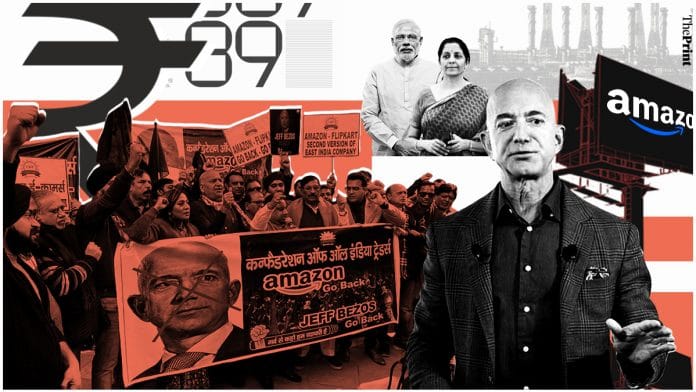Amazon CEO Jeff Bezos is visiting India for the Smbhav summit, a gathering for small and medium businesses. Bezos’ visit has sparked protests by traders who have accused Amazon of malpractice and repeatedly flouting FDI norms. The Competition Commission of India has also ordered a probe into Amazon and Flipkart for their alleged predatory pricing and exclusive tie-ups with brands.
ThePrint asks: Indian protests & probe against Amazon: Right message to investors in a slowing economy?
Amazon should leave India if it can’t follow regulations. We don’t need a second East India Company
 Praveen Khandelwal
Praveen Khandelwal
National Secretary-General, Confederation of All India Traders
While India has opened its doors to foreign investment, it is first a sovereign state that cannot compromise on law. Amazon and Flipkart have been flouting FDI norms for the last five years by indulging in deep discounting, influencing other private players and killing retail trade.
There are certain sectors that desperately need investment like infrastructure, logistics, tech, warehousing, etc.
The retail sector, of which e-commerce is a part, has an annual turnover of $650 billion and the non-corporate sector (excluding farming) contributes 45 per cent to India’s GDP growth. So, when a sector is already performing considerably well, why invite foreign investment at all? Additionally, small and medium businesses can digitise themselves without Amazon CEO Jeff Bezos’ pledges. Indian traders have already started developing e-portals.
There is no doubt that e-commerce is a fast-growing business in India, but it must adhere to policies, basic fundamentals of pricing and regulations. If Amazon doesn’t intend to conduct business according to government norms, then it should leave India, which clearly doesn’t need a second version of the East India Company.
The CAIT had twice written to PM Modi in 2019 expressing its displeasure with how Amazon and Flipkart have adversely impacted retail trade, but he is yet to reply. We hope PM Modi will sympathise with the ground reality of traders and realise that e-commerce companies are derailing the government’s goal of making India a $5-trillion economy by 2024.
Probing e-commerce firms after all the horses have bolted years ago makes little sense
 K Vaitheeswaran
K Vaitheeswaran
Serial entrepreneur, author of “Failing to Succeed – The Story of India’s First E-Commerce Company”
When Jeff Bezos came to India five years ago, he committed $2 billion to the e-commerce industry. This time, he’s committed $1 billion, suggesting that India is probably Amazon’s fastest-growing market in the world. Except that he landed at a time when the Narendra Modi government has announced an anti-trust probe into the practices of e-commerce companies. Not to mention protests by the traders’ association against Amazon. Warm welcome, that.
Despite regulations prohibiting FDI into B2C eCommerce in India, e-commerce firms have successfully managed to skirt laws and raise billions of dollars from overseas investors for over a decade. In my view, probing e-commerce companies after all the horses have bolted years ago makes little sense. If anything, we should simply allow FDI in all forms of retail. We are a country that welcomes FDI in defence manufacturing. Why not retail? Globally, retail industry is among the top employers, and at a time when we need jobs, we should encourage huge retail investments.
Of course, millions of small traders are impacted by e-commerce giants that lure customers with deep discounts. Unfortunately, neither protests nor probes are the answers. The convenience and discounts offered by e-commerce are here to stay and the measures proposed by the authorities such as monitoring online prices for millions of items is impractical. Also, why is this concern only against global giants like Amazon and Walmart? Who is to say that an Indian giant, after getting protection, won’t create a large e-commerce play and use the same deep discounting strategy against small traders?
E-commerce giants like Amazon that threaten small retailers are also adding to India’s economic woes
 Ashwani Mahajan
Ashwani Mahajan
National Co-Convener, Swadeshi Jagaran Manch
As long as foreign investment increases employment and production, it is welcomed. But companies like Amazon that violate FDI norms are not good foreign investors because they engage in illegal and unethical business practices. They have repeatedly circumvented the law and are also involved in cash-burning to sell goods at cheaper prices and pushing competitors (small retailers) out of the market.
In trying to monopolise markets, Amazon has ruined small traders like kirana stores and shopkeepers. By protesting against Amazon CEO Jeff Bezos’ visit to India, the traders’ confederation has given the right signal to the global economy: India is not a country where foreign investors are treated like gods. One must also be wary of companies like Amazon because they also collect data.
It is important to understand that the current economic slowdown in India is also because small shopkeepers, who are responsible for spurring consumer demand, have been negatively impacted – both in terms of employment and incomes.
E-commerce giants that put additional pressure on small entities are only contributing to the slowdown. I see this pattern all over the world. Even in a small American city like Columbus, malls and mom-and-pop shops have closed down. I hope PM Narendra Modi does not meet Jeff Bezos and instead takes action against these Amazon-type toxic business models.
India can’t afford to turn away global investors. Address their top worry: policy instability and unpredictability
 Prasanto K Roy
Prasanto K Roy
Technology writer and policy consultant
A CCI probe into predatory discounting by Amazon and Flipkart is not unreasonable, given their financial muscle and exclusive brand deals. Regulators must protect a level playing field.
But after nationalist policy moves, often with multinational corporations in the gunsight, the government will need to ensure that it is not hurting the economy and investor sentiment.
The commerce ministry’s DPIIT had abruptly issued ‘Press Note 2 of 2018’ in December 2018 with rules preventing e-commerce platforms from owning stake in retail sellers or brands. The abrupt action during peak global vacation time, sans consultation, refusal to discuss feedback or extend a harsh deadline, the applause from Mukesh Ambani who then announced Reliance’s e-commerce plans brought in questions about India’s motives.
Earlier, DPIIT’s Press Note 3 of 2016 had already outlined restrictions for foreign-funded e-commerce platforms. But these rules, designed to protect smaller and offline sellers, weren’t fully enforced. E-commerce giants had stakes in sellers exceeding specified limits. But a failure to enforce the law is hardly ground for repeated knee-jerk changes that hit out at firms representing 80 per cent of India’s e-commerce market.
We are heading into a series of new digital regulations: a privacy bill that sprang a surprise by demanding non-personal data, intermediary guidelines, a national e-commerce policy. With economy skidding and jobs shrinking, India can’t afford to turn away global investors pumping in billions of dollars of investments. It needs to address their top worry: policy instability and unpredictability.
Also read: Telecom crisis, targeting e-commerce: Is Ease of Doing Business in Modi’s India a myth?
By Pia Krishnankutty, journalist at ThePrint







Wall mart wiped out all Mom and Pop stores in the USA wherever they opened for business. The model is not new and data exist from 30+ years.. Either you accept or you do not.What negotiation will work in India but that failed in the US??? Amazon added door delivery too. Nuts to reject a new India.
Amazon is East India company in the making, India is reverting to 17-18th century.
Piyush Goyal should get off his high horse and first learn to address Indians in their own languages, not just Islamic origin language Hindi. Already crores of public money is being wasted on that Islamic origin language Hindi and that mindset cannot sustain any business. Railways long ago lost their priorities, for them that particular language has been more important than even cleanliness, security and basic comfort to passengers while denying to address Indian passengers in their own languages.
At least Amazon is providing employment to 1000s of people. Amazon is also reaching out to the Southern rural market which has been neglected and which the North India based websites have failed to do so.
Indian government should make atmosphere to first revive the economy which they have caused to collapse including GST, DeMo etc..
This submission comes from the heart more than the head, since I am not knowledgeable about the business models of the e commerce retail giants. If they are using predatory pricing to drive small retailers out of business – what Jio has done with large rivals like Vodafone and Airtel – let that be enquired into. 2. There is a long record of the FDI policy in India – for most sectors – being dictated by dominant domestic firms, Jet Airways being an excellent example. Our normal approach – there was no reason to give Walmart such a rough ride – should be to welcome FDI across the board, not so much for investment inflows as for the technology and marketing best practices they bring in. 3. Our intervention – possibly at the intervention of Reliance – to trouble Amazon and Walmart’s local acquisition drew a sharp riposte from the US government, may have cost GSP benefits. 4. About time India started creating global firms like Alibaba. Feel sorry for the mom and pop stores, but they are on the wrong side of history.